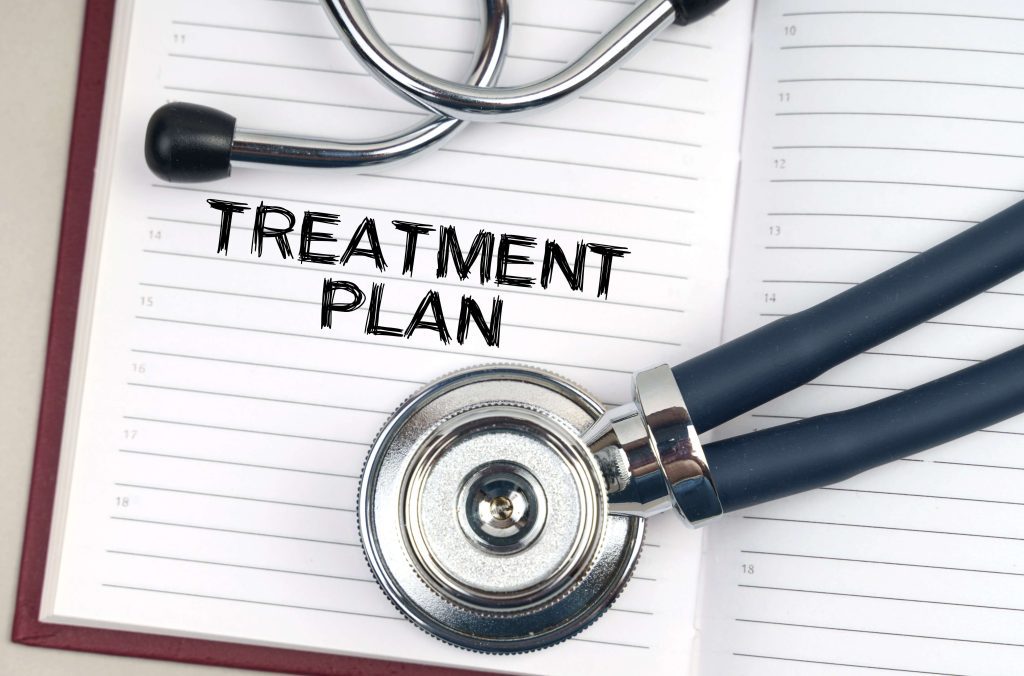Treatment Plan Examples
In the realm of mental health and addiction treatment, the creation of a detailed treatment plan stands as a cornerstone of effective patient care. Utilized by a broad spectrum of health professionals—including psychiatrists, psychologists, counselors, and social workers—these plans serve as a roadmap for treatment, facilitating progress tracking, organization, and personalized care.
At the core of our approach is recognizing each patient’s uniqueness. Our team, composed of seasoned clinicians, collaborates closely with patients to craft treatment plans grounded in evidence-based methodologies. This process directs patients toward recovery and growth and instills a sense of direction and purpose in their journey towards healing.

What Is a Treatment Plan?
A treatment plan is a detailed plan tailored to the individual patient and is a powerful tool for engaging the patient in their treatment. Treatment plans usually follow a simple format and typically include the following information:
- Individualized means that problems that are identified in the assessment process must be “addressed”—whether the treatment planned them refer them (because your treatment center doesn’t provide that service), or deferred them (because it’s not a good time, such as if the patient needs to be stabilized before job hunting)
- Goal and Action-Oriented means the treatment plan must include the Goals to be reached that address each problem.
- Information from the assessment includes the diagnosis and medical/physical exam.
- Patient-Centered. Treatment planning is a team effort between the patient and the health specialist. Both parties work together to create a shared vision and set attainable goals and objectives.
Key Components of a Treatment Plan
A comprehensive treatment plan typically encompasses:
- Patient Information: Critical for personalizing the treatment, including details like name, social security number, insurance information, and contact details.
- Diagnostic Summary: An overview of the patient’s current mental health issues, informed by thorough assessments.
- Treatment Goals and Objectives: Clearly defined, measurable goals and objectives tailored to address the identified issues, complete with achievable timelines.
- Progress Tracking: Dedicated space within the plan for monitoring patient progress and adapting the treatment as necessary.
Crafting a Patient-Centered Treatment Plan
Effective treatment planning is inherently collaborative, requiring active participation from the patient and healthcare provider to set realistic goals and actionable steps. This partnership ensures that the treatment plan addresses immediate issues and lays a foundation for sustained health and well-being.

Treatment Plan Template
A treatment plan is simple but specific. Although treatment plans vary, a treatment plan template or form generally contains the following fields:
- Patient information: At the top of the treatment plan, the counselor will fill in information such as the patient’s name, social security number, insurance details, and the date of the plan.
- Diagnostic summary: Next, the counselor will fill out a summary of the patient’s diagnosis and the duration of the diagnosis.
- Problems and goals: The third section of the treatment plan will include issues, goals, and a few measurable objectives. Each issue area will also include a time frame for reaching goals and completing objectives. Counselors should strive to have at least three goals.
- Signatures: The final section of the treatment plan is where the counselor and the client sign their names. This signifies that the patient participated in developing the treatment plan and agrees with the content.
Treatment Plan Example (PDF To Download)


The structure and intent behind treatment plans are fundamental in navigating the complexities of mental health and addiction treatment. By emphasizing individualized care, goal orientation, and therapeutic partnership, we enhance our capacity to guide patients through their recovery with clarity and empathy.
Published: March 07, 2024
Last Updated: April 03, 2024

Published: May 23, 2025
Intensive Outpatient Program Duration
Intensive Outpatient Programs (IOPs) bridge the gap between full-time residential care and traditional outpatient services. Designed for individuals who require more structured support than weekly therapy but do not need 24-hour supervision, IOPs offer flexibility—letting clients continue to work, attend school, or care for family while engaging in an intensive treatment schedule. Overland IOP in […]
Read more
Published: May 02, 2025
What Is Mental Health? Definition, US & California Statistics
Mental health is a fundamental aspect of overall well-being, shaping how we think, feel, and interact with the world around us. It influences every decision we make, how we handle stress, and the way we build relationships. In today’s fast-paced society, where anxiety, depression, and burnout are increasingly common, understanding mental health has never been […]
Read more
Published: April 17, 2025
Workforce Challenges in Behavioral Health: US & California Perspective
The United States is grappling with a significant behavioral health crisis, marked by a rising demand for mental health and substance use services. Central to this issue is a critical shortage of behavioral health professionals, a problem that is particularly pronounced in California. As of December 2023, more than half of the U.S. population—approximately 169 […]
Read more
